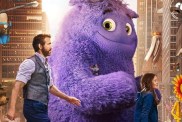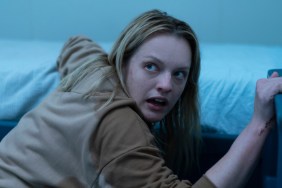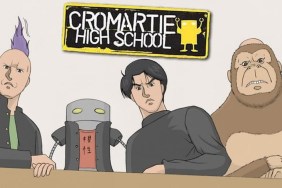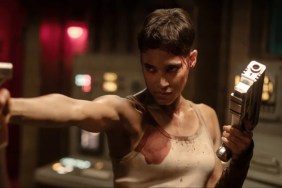Reese, Wernick on undead cinema, Paul McCartney, deleted scenes & more

While on the set of Zombieland, our own Ed Douglas got chatting with screenwriters and executive producers Rhett Reese and Paul Wernick and learned about the genesis of their comedy, horror, road trip mash-up. Its transition from television to film is chronicled here and it covers quite a bit of ground.
However, when I caught the film – one of my favorites of this year – I wanted to sit down with Reese and Wernick myself to pick their brains, so to speak, and talk to the latest writers to make a hilarious, gruesome and even heartfelt contribution to the cinematic zombie pantheon.
Woody Harrelson and Jesse Eisenberg star as Tallahassee and Columbus, respectively, survivors of a zombie apocalypse who meet on the open road and forge a friendship. Along the way, they meet sisters Wichita and Little Rock (Emma Stone and Abigail Breslin) and altogether they make their way west, kicking, shooting and hacking at every zombie that comes their way.
Below you’ll find my conversation with Reese and Wernick that took place last week when we met up at a Brentwood coffee shop.
Ryan Rotten: Watching the film, I couldn’t help but think: Which one of you is Columbus and which one of you is Tallahassee?
Rhett Reese: Well, I’m Jesse [Columbus]. He’s less Woodyâ¦
Paul Wernick: I’m less Woody, but Rhett’s more Columbus than I think even Jesse is.
Reese: My cousin took her little children to an event called Safety Town. It’s a place where these little kids run around and learn to be safe in different environments. If there’s poison in a cabinet, don’t drink it. If you find a gun, tell an adult. She told me this story and I was like, “Oh my God, I grew up in Safety Town!” My parents were protective, in a good way. There was danger lurking everywhere. My dad, when he introduced you to a new activity, he would tell you about the worst thing that ever happened to someone doing that activity. I assimilated that and I’m just a naturally anxious, phobic person. Then it occurred to me, wouldn’t that be just the kind of person who would survive a crazy world? Someone who’s always thinking about how to stay safe. [To Wernick] But you’re less Woody, though you and Woody are similar in some ways. Social and outgoing. Tallahassee and Woody though, are different. Woody is much more sophisticated than Tallahassee. You’re more fearless than I.
Rotten: During the writing process did you trade off voices where one of you tackled one character?
Reese: We don’t work that way, actually. We trade scenes as opposed to voices. Then we re-write each other and swap scenes until our styles coalesce into one style and you can’t tell.

Wernick: The times we’re together is when we’re breaking story. Break out the big board, lay it out and the outline. We trade off scenes and go back and forth until we think it’s great or can’t take it anymore. There are a lot of writers that will sit in the same room together, but we don’t do that.
Rotten: I was surprised to have learned this film stemmed from something that was geared for television. Was it a tough sell at all to get the studio on board another zombie film?
Reese: The reason it was tough, well, the toughest reason was that so many movies are based on IP, other properties. Whether it be a remake, a reboot, a sequel, a toy they want to turn into a movieâ¦
Wernick: A board game.
Reese: A graphic novel. And it’s tragic, really, that so few movies these days originate from screenwriters. Television is the opposite. Every show is created by a writer, basically. So when we originally sold it, it was very much the model. Then it came back to us after we sold it to CBS and they didn’t make it. It was only by virtue of the passion and vision of a handful of people at Sony. It was their passion to say, this is an original idea that should break through in the movies. No, it’s not original in that it’s a zombie movie. But, it’s a movie that’s not based on anything else.
Wernick: It has a fresh voice.
Reese: And it also started as a pilot, which is a rare transition. It was a circuitous route and I think it was really a tribute to the people who took a risk on an original idea. That’s the tragic nature of movies is that they’ve moved away from being original and we’re trying to strike a blow for screenwriters.
Wernick: Interestingly, it became a TV pilot because we looked at the landscape and said, these are such huge hits on the feature side. Let’s make a zombie TV show. Ultimately, the irony is that it became a movie but maintained its originality.
Rotten: Strangely enough, someone is doing a zombie TV show now with Darabont on board The Walking Dead.
Reese: Which is a cool graphic novel. And that should work.
Wernick: Ultimately, we’d love Zombieland to go back to television, maybe make a few feature sequels. Fall into that existing IP where there’s nothing original. Let’s go make something again! [laughs] We, too, will not only have a victory for screenwriters, but strike a blow for originality with a sequel.
Reese: Zombieland 7. Forget anything original, stick to what works. [laughs]
Rotten: What I love about the film is that it dispenses with the need to show everything. You’re picking up with the lives of these people dealing with the problem.
Reese: And that’s because everyone knows the zombie genre so well. We don’t have to do any exposition. We were adamant about not starting at the beginning and having a General come on and tell everyone to stay in their homes. We didn’t want to do that, we wanted to start in the middle. People can fill in the gaps. They know the zombie rules. So, now you get to start with character and action and get right into it. That was a joy.

Rotten: Did you feel any studio pressure to show the requisite scenes you described?
Reese: No, not at all because everyone just got it.
Rotten: The buzz from these early screenings has to have the studio anxious for sequels. Have they recently approached you about spinning your wheels for plot ideas?
Wernick: We’ve been spinning our wheels for a while because we love the world so much and because it began as a TV project, we started to think long-term and how to sustain the world. The first 45 to 50 minutes of the movie are the pilot and the last half of the movie is essentially episode two. We have a brainstorming document we open often and we have some fun ideas for a sequel.
Reese: But Sony has told us it will depend on the box office gross. A couple of weeks in, it opens on October 2, so by mid-November they’ll have an idea if the box office will sustain a sequel. Everyone has passion for it, everyone would like to do it, we need to make sure America wants to see it.
Rotten: I’d like to mention the cameo you have in thisâ¦
Reese: We originally wrote the part for Patrick Swayze. That was many years ago, before he got sick. It was [going to be] a Patrick Swayze zombie. They got attacked by him zombified and we had these wonderful moments where they found a potter’s wheel and there’s Columbus on the wheel and these other hands come up behind him and it’s Patrick Swayze the zombie. Ultimately, they fight and Patrick bull rushes Tallahassee who grabs him and lifts him into the air, a la Jennifer Grey, and smashes him into a pillar. We specified it to Patrick Swayze and then he tragically got sick. So we had to switch off of that and went withâ¦
Wernick: Stallone was second.
Reese: We’d try to draft it to the actors. So we had The Rock.
Wernick: Joe Pesci, Mark Hammill, The Rock, Kevin Bacon, Jean-Claude Van Damme and Matthew McConaughey, who said yes, but backed out at the last minute.
Rotten: Meeting Reuben Fleischer, did you know instantly he was the right man for the directing job?
Wernick: He was so fantastic, inclusive and collaborative. He brought the world that was on the page to life and it’s so rare for our creation and the characters you birth four years ago.
Reese: He’s got a great visual eye. He sees things cinematically so the picture looks great. We’re very happy.
Rotten: Was there anything that got excised that you were heartbroken about?
Reese: A lot. I think the first cut of the movie was two hours and now it’s 83 minutes. Literally 45 minutes is out. As writer it’s tough because those are your babies, but then you have to weigh pacing against loving a joke or a moment. We will have the DVD which is full of extras. Full of scenes that didn’t make it in and an entire character who didn’t make it into the film.

We hadn’t cast the part yet.
Wernick: It was a voiceover.
Reese: A voiceover over a speaker. So it was a voice. It didn’t make it in. It was a fun character.
Wernick: More than anything, the film got tighter. We didn’t lose tone, we didn’t lose themes. It’s as if it went through a compression on a computer. It squeezed every scene just a touch. The movie plays great. While we lost some great stuff, Reuben had a great vision and he saw it through. His idea was to keep them wanting more. And it’s so rare. Movies are too long these days. As often as we kicked and screamed when we lost stuff, the final product proves to be great. It’s just more stuff for the sequel.
Rotten: Drop on me some of your favorite zombie filmsâ¦
Wernick: I’m a zombie virgin. I’m not the zombie junkie Rhett is. I’ve only seen a small handful, but I think I brought a unique perspective to the genre not having a history with it.
Reese: You went from the zombie virgin to the zombie slut.
Wernick: I did, I did.
Reese: I wouldn’t call myself a zombie junkie, but I do have favorites. One of them is 28 Days Later.
Rotten: The one fans debate whether it’s a zombie film or not.
Reese: Yes. And I feel, what the heck. It reinvigorates the genre as opposed to disrespecting it. I feel there’s room for zombies of all speeds and colors. I say 28 Days Later, old Dawn of the Dead, new Dawn of the Dead, Army of Darkness, 28 Weeks Later, Shaun of the Dead. To be honest, I still haven’t seen the seminal ones and I’ll get to them. I’m respectful of the fact that we’re in the zombie club. If I’m to believe and thinking I’m right, the Peter Jacksons, the Danny Boyles, the Stephen Kings, the people who have dabbled in this genre are in fact fans of it and will hopefully go out and see this. That’s the greatest feeling.
Wernick: Woody told a story that he was coming off a plane and he attacked the paparazzi. He went to dinner that night with Paul McCartney. And McCartney told him, you have to use the zombie defense as an excuse. The next day Woody issued a press release saying he thought the paparazzi was a zombie. All I kept thinking was, holy shit, a Beatle knows about our movie.
Reese: My goal in life is to make Stephen King’s top 10 movies of the year. If I make that, I’ll walk into traffic and be done.

Wernick: King has a connection to the movie in the sense that when we were trying to get the movie off the ground and it had not been picked up as a pilot, we sent the script to King. There’s a website, a Federal Election Commission website, that has all of the donors and it lists their home address and how much they gave to each political campaign. So there’s Stephen King’s address.
Reese: Bangor, Maine. We sent it to his home and I got an e-mail from his assistant saying, “I’m sorry, Stephen doesn’t have time to look at it.”
Wernick: And he doesn’t take submissions.
Reese: It was a blow. [To Wernick] And you practically assaulted Quentin Tarantino at an awards show.
Wernick: I did. I went up to him and said we had this script and he’d be the perfect guy to get the pilot off the ground. He said, “Oh, I’ve heard of it, I think it’s on my desk, I’ll read it.” I don’t know if he ever did.
Reese: I assaulted Jonah Hill and Seth Green in public and was like Zombieland and they looked at me like I was a zombie. You just figure, in this town, there are no rules. Well, there may be rules, but we don’t follow them. There’s a long list of people and people waiting to get to them. John Carpenter. He read the script and wanted to direct the pilot, but we could never get it off the ground.
Wernick: I remember our producer was like, “You read the script, what would you do?” And he said, “Shoot it.” With those older guys, it’s like Clint Eastwood, they don’t f**k around. If they find something they like, they’ll do it. It was such a dream to sit in the room with him.
Rotten: Before we wrap this up, what was the most fun you had on the set?
Reese: For me, it was the trading post scene. I’ve had this dream of destroying stuff. Like, walking into an antique store and just messing it up. We thought, that’s one of the vicarious thrills you can have in the world of zombies is being able to destroy a room full of stuff. The great thing was, everything in the trading post was created by us and bought by us. At the end, they were just going to throw everything away and trash it. At three in the morning, the actors beat the shit out of the room, but when they were done, half of the room was still intact. We look around and think to ourselves and the next thing you know, Paul and I are grabbing stuff and throwing it against the wall, smashing things to the floor.
Wernick: I threw a pot as hard as I could and my elbow for four months was bothering me. That scene was such a wish fulfillment for the actors. When was the last time you intentionally broke something? It’s so much fun. You start giggling when you break shit.
Reese and Wernick tell me they’re looking at a number of assignments right now. One of their duties presently is doing a rewrite of Earth vs. Moon for Universal Pictures, but the two reiterated that they have their fingers crossed that they’ll return to Zombieland again.





Source: Ryan Rotten, Managing Editor









